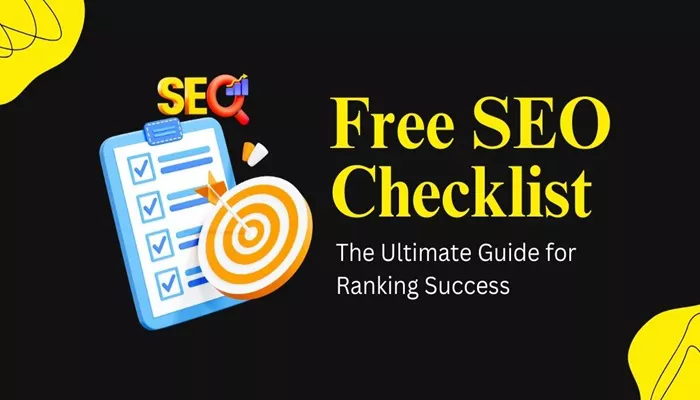SEO optimization is a crucial challenge for every website owner. Whether a site ranks well in search engines directly impacts traffic and conversions. This article offers a detailed, easy-to-understand free SEO checklist covering every essential aspect of SEO. It helps you systematically improve your site’s performance. The content is comprehensive, practical, and suitable for beginners and experienced digital marketers alike.
How to Make the Most of This Free SEO Checklist
SEO involves many complex steps, and it’s easy to overlook critical details, which can hurt your rankings. This checklist compiles proven strategies from top SEO experts to guide you through each essential task. Completing these tasks will not only boost your search visibility but also improve user experience, keeping visitors engaged longer and increasing the chances of conversion.
For best results, print or save this checklist and work through it step-by-step. Use tools like Google Search Console and Google Analytics to monitor your site’s data regularly. Adjust your optimization based on these insights. SEO is not a one-time project; it requires ongoing effort and refinement. Mastering this checklist means having a clear, actionable path to better rankings.
Setting Up the Essential SEO Tools
Good SEO starts with the right tools, which act as your eyes and brain for website optimization and performance tracking. First, there’s Google Search Console (GSC). It connects directly to your site and provides data on search performance. GSC shows which keywords bring traffic and which pages get impressions but no clicks. This information is invaluable for refining your keyword and content strategies. Integrating GSC with tools like Semrush helps unify your data and boosts efficiency.
Next is Bing Webmaster Tools. Although Bing’s traffic is smaller than Google’s, it still matters. Bing covers not only its own search engine but also partners like DuckDuckGo and Yahoo, providing an additional source of visitors, especially in some markets.
Google Analytics (GA) complements GSC by providing broader insights into user behavior, including visit paths, time spent on site, and demographics. GA lets you understand your audience deeply and improve content and experience accordingly.
If you use WordPress or Shopify, installing SEO plugins like Yoast or Rank Math is essential. These plugins help manage on-page SEO, create sitemaps, and warn you about keyword stuffing or other SEO errors.
Additionally, calculating your SEO return on investment (ROI) is crucial. SEO results typically take months to manifest, so tracking progress and adjusting strategies ensures your efforts pay off over time. Many beginners overlook this and end up with unfocused optimization.
Finally, registering for a free Semrush account or starting a 7-day trial provides powerful tools for keyword research, technical audits, and content optimization, laying a strong foundation for your SEO work.
Keyword Research: The Heart of SEO
Keyword research is the cornerstone of successful SEO. Choosing the right keywords attracts targeted and sustainable traffic. Instead of chasing broad, popular terms, focus on long-tail keywords. These are more specific, reflect clear user intent, and usually convert better.
Several tools assist keyword discovery. Google Suggest offers real-time suggestions based on user input, Exploding Topics identifies rapidly trending subjects, and Semrush’s keyword magic tool provides in-depth analysis. Community platforms like Reddit and Quora reveal real user questions and discussions, offering inspiration for keywords and content ideas.
Also, tools like “People Also Ask” and AlsoAsked uncover related queries that users frequently search for, helping you build richer content around your core keywords.
Smart keyword research ensures your content matches search habits and attracts high-quality visitors.
On-Page SEO Optimization Techniques
Every page is an SEO battleground where attention to detail determines your ranking. Place primary keywords strategically—in the URL slug, title tag, meta description, headers, and image alt text. Use keywords naturally without stuffing to avoid penalties from search engines.
TF-IDF tools help analyze keyword density and benchmark against competitors. Use this insight to optimize your keyword placement and density for best results. Incorporating semantically related secondary keywords covers broader user intent and reduces bounce rates, enhancing page authority.
Internal links strengthen your website’s structure and help search engines crawl your site efficiently. Outbound links should point to high-quality, authoritative websites with keyword-rich anchor text, but avoid overdoing it, as excessive linking can harm your site’s credibility.
These on-page strategies improve rankings and create a better, more logical experience for your visitors.
EEAT and Building Content Credibility
Google increasingly prioritizes content’s Expertise, Experience, Authority, and Trustworthiness—known as EEAT. These criteria heavily influence how search engines judge your content quality.
To build strong EEAT signals, create detailed author bios showing credentials and link to social profiles and reputable platforms. This boosts your content’s trustworthiness. Cite authoritative sources and share firsthand experience to add credibility and authenticity.
Storytelling and real-world examples enhance your content’s authority and make readers feel your expertise.
Meeting EEAT standards helps your site stand out amid fierce competition and maintain stable rankings over time.
Conclusion
This free SEO checklist covers everything from foundational tools and keyword research to on-page optimization and content credibility. It’s a comprehensive guide for any website owner serious about improving their search presence.
Save or print this checklist and follow it carefully to ensure nothing is missed. Use Google Search Console and Analytics to track progress and fine-tune your efforts continuously. SEO is a marathon, not a sprint, and constant learning and adaptation are essential.
Related Topics
- How to Use Google Gemini for Better SEO?
- The Future Of Seo As The Future Google Search Rolls Out
- Why Is Technical SEO Crucial for Your Website’s Success?

